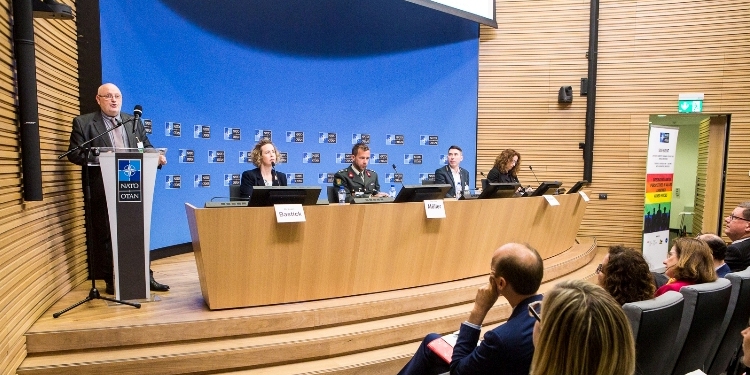First ever LGBTQI event at NATO
On 6 June 2019, the European Organisation of Military Associations and Trade Unions (EUROMIL), the Permanent Representation of Belgium to NATO and the Joint Delegation of Canada to NATO, co-hosted a panel discussion on “Integrating LGBTQI Perspectives in Allied and Partner Armed Forces” at the NATO Headquarters in Brussels.
The panel discussion was organised as a side-event taking place in the framework of the Annual Conference of the NATO Committee on Gender Perspectives (NCGP) as part of the continued efforts to strengthen and support gender mainstreaming, inclusivity and diversity initiatives.
The discussion was opened by Ambassador Pascal Heyman, Permanent Representative of Belgium to NATO and Emmanuel Jacob, President of EUROMIL. Ambassador David Angell, Permanent Representative of Canada to NATO, closed the event. Speakers included Capt Jaus Müller, President, Foundation for homosexuality in the armed forces in the Netherlands (SHK), Laura Birkman, Senior Analyst, The Hague Centre for Strategic Studies (HCSS), Sgt Richard Muldarry, Chairperson, Defend with Pride, and representative, Permanent Defence Force Other Ranks Representative Association (PDFORRA), Ireland. Megan Bastick, Gender and Security Fellow in the Gender and Security Division, Geneva Centre for Security Sector Governance – DCAF, moderated the discussion.
The aim of the side-event was to provide a forum where lead nations and actors working on integrating diversity and inclusion perspectives in the defence sector could share experiences, lessons learned, and best practices in promoting Lesbian, Gay, Bisexual, Transgender, Queer and Intersex (LGBTQI) rights, equality and inclusion. It was the first ever event on LGBTQI Perspectives at NATO.
Globally, LGBTQI people continue to face discrimination, harassment and violence based on their sexual orientation or gender identity.
Armed forces certainly came a long way since lesbians and gays where allowed for the first time to openly serve in the Dutch armed forces in 1974. However, the approach towards LGBTQI participation widely varies among countries and in all militaries, LGBTQI personnel continue to face challenges not faced by their peers.
LGBTQI integration in armed forces is first and foremost a matter of justice, equality and human rights. It should be argued that if people are willing to serve their country, they then deserve to be recognized and respected for who they are. Military personnel are human beings, protecting other people with pride and dignity. The armed forces should thus be reflective of the society they serve, and no one should suffer in silence or be ashamed of who they are.
In recent years, LGBTQI inclusion has also started to be considered as a matter of operational effectiveness. Diversity and inclusion are critical if defence organisations want to survive and prosper in a security environment in constant evolution. Personnel should be recruited based on talent rather than ethnicity, gender, sexual orientation or gender identity. Recognizing people for who they are will increase their motivation and performance at work, reinforce the moral of the troops, unit cohesion and impact preparedness.
As an international organisation based on common values (values of individual liberty, democracy, human rights and the rule of law), NATO should lead by example, by promoting LGBTQI rights and by acting towards inclusive armed forces. International organisations should also collaborate on this issue.
Identified best practices include leadership, training, code of conduct, support networks and mentors, antidiscrimination policies, recognition of same-sex relationships, recognition of transgender identity, including and protecting personnel abroad (including those serving in multinational missions).
LGBTQI staff associations play an important role in protecting and promoting the rights of service personnel. Some leaders of these associations however wish they could stop one day, when we would live in equal societies. It is important that LGBTQI personnel are enabled to share experience on their needs and feelings and are consulted by the defence organisation, in a spirit of mutual trust and dialogue. The specific needs of transgender and intersex people should also be taken into consideration. The support of allies is of extreme importance in this process. Leadership and education are key for success.
The LGBT Military Index, created by the Hague Centre for Strategic Studies, is a conversation starter and a useful tool. The objective of the initial study was to systematically assess LGBT inclusion into the decision-making and functioning of armed forces worldwide. The Index was created in 2014 and nowadays needs an update as policies and practices evolved in 5 years. However, its methodology and recommendations remain valid. Different indicators were used to measure inclusion, admission, tolerance, exclusion and persecution. Based on the results, three categories of countries were identified to which recommendations were made, inclusion countries to share best practices, admission and tolerance countries to identify opportunities for greater inclusion, and exclusion and persecution countries to clarify conditions for international cooperation and service. It was also recommended to compare best practices and military performance to maximize synergy between LGBTQI participation and military functioning, to highlight mismatches between societal and military levels of inclusion to align mismatches between societal acceptance and military policy, and to compare rankings with the standing of military allies. Best practices of inclusions should then be adopted through mainstreaming, managing and measuring strategies.
Lessons may also be learned from other private and public sectors and organisations. In the defence sector, studies show that diversity and inclusion increase military effectiveness. Confronting best practices with military performances is indeed the best way to encourage countries to engage on the matter. Data collection is also relevant.
This first discussion enabled participants to collectively plant the seed for lifting taboos and changing mindset regarding LGBTQI inclusion. It was important to have an open discussion on the issue and engage with other NATO allied and partner armed forces that are not on the same page. Learning from each other and mainstreaming LGBTQI inclusion is a collective responsibility. An inclusive defence sector is a more effective defence sector!
Picture © BE Defence/Malek AZOUG

